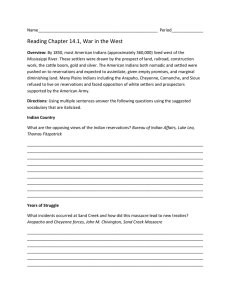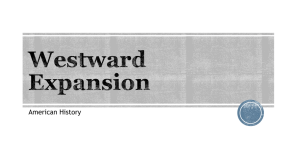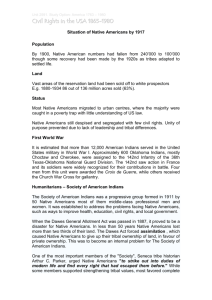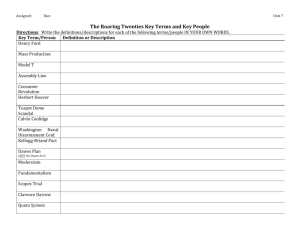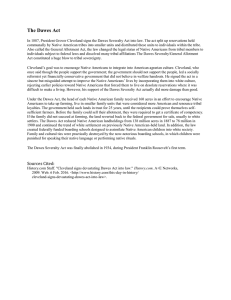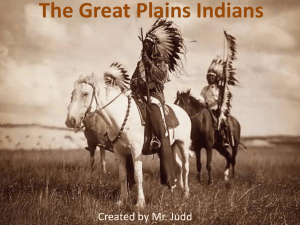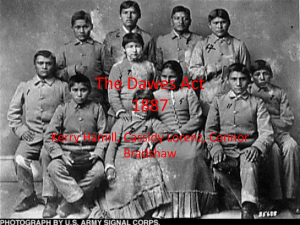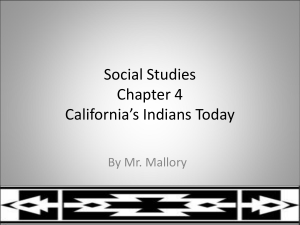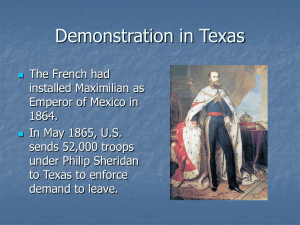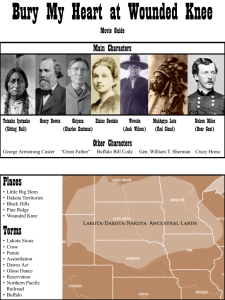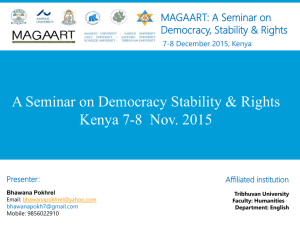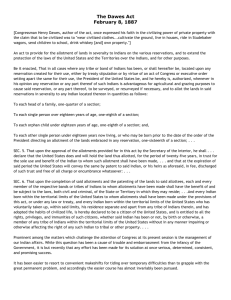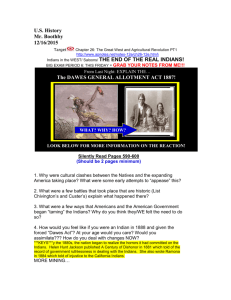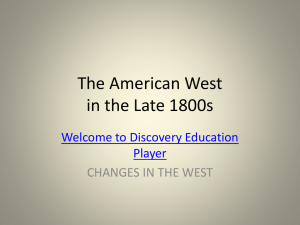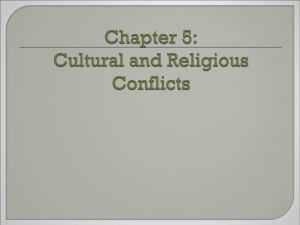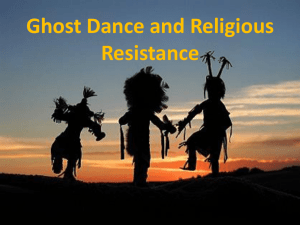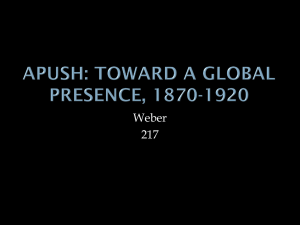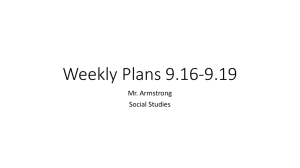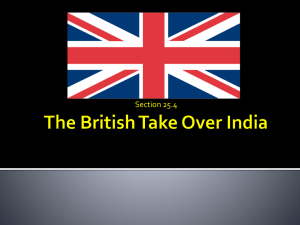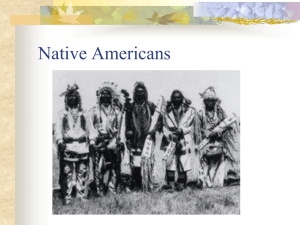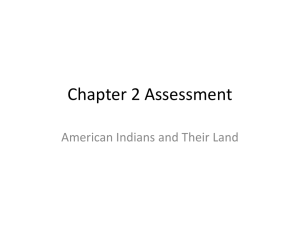Ethnocentrism - Londonderry School District
advertisement
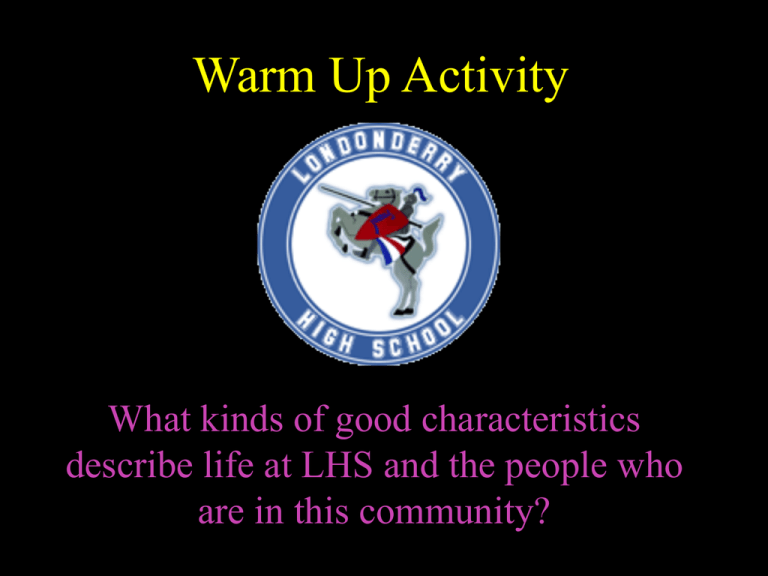
Warm Up Activity What kinds of good characteristics describe life at LHS and the people who are in this community? Warm Up Activity Imagine that a new group of students is coming to LHS. These newcomers want you to wear a particular type of clothing, give you new names, change the Lancer mascot and LHS school colors. Because the new students will eat in the café at lunchtime, you must eat in an empty classroom. Since these new students don’t speak English, you will not be allowed to speak English and have to learn their language Conflict & Struggle The federal government began moving the Indians to large reservations. •Most reservations were on poor land and the Indians were often tricked to move there. •Many Natives moved to the reservations but some resisted. •In turn there were several deadly battles with mostly Native American deaths. A Changed Culture •Reformers like Helen Hunt Jackson were horrified at the treatment of Native Americans and pushed for reforms. •Felt the situation could improve if Native Americans could assimilate into American society as landowner and citizesns The Dawes Act of 1887 •The law aimed to give Native Americans private individual ownership of land, eliminate their nomadic lifestyle, and encourage them to become Americanized. •The law broke up the reservations in an attempt to end tribal identification so these people could assimilate to American society. What Makes Someone Civilized?? Ethnocentrism Congressman Henry Dawes, author of the act, once expressed his faith in the civilizing power of private property with the claim that to be civilized was to "wear civilized clothes...cultivate the ground, live in houses, ride in Studebaker wagons, send children to school, drink whiskey and own property." The tendency to believe that one's ethnic or cultural group is centrally important, and that all other groups are measured in relation to one's own. The ethnocentric individual will judge other groups relative to his or her own particular ethnic group or culture, especially with concern to language, behavior, customs and religion Captain Richard H. Pratt • While some colonizers advocated outright physical extermination, he thought it wiser to “Kill the Indian and save the man.” • In 1879 Pratt, an army veteran of the Indian wars, opened the first federally sanctioned boarding school called Carlisle Indian Industrial School • His philosophy was to “elevate” American Indians to white standards through a process of forced acculturation that stripped them of their customs • They were each given new haircuts, uniforms of European-American style clothes, and even new English names School Time or Rule Time? • Most children sent to schools to become deculturized • In these schools they were forced to speak English, study standard subjects, attend church, and leave tribal traditions behind. Wanted them to Become Christianized • Felt these people needed Jesus and the Bible in their lives to become civilized • Church officials, missionaries, and local authorities took children as young as five from their parents and shipped them off to Christian boarding schools • They forced others to enroll in Christian day schools on reservations. Quote Examination 1. "The Indian may now become a free man; free from the thralldom of the tribe; free from the domination of the reservation system; free to enter into the body of our citizens. This bill may therefore be considered as the Magna Carta of the Indians of our country.” Alice Fletcher. 1. "The Dawes Act was a way to break up the whole tribal structure of Native American nations. Instead of saying you are a group of people, all of a sudden you are individual landowners ─ you are Americans. And so it was designed to break up community, to civilize people, make us farmers, and also break up our tribal structure."Charlotte Black Elk Some called this assimilation "making apples", as the Indians would still appear 'red' on the outside, but would be made 'white' on the inside Dawes Act was a Failure • Few Natives Americans had the training or enthusiasm for farming or ranching • They found the allotments too small to be profitable • Few were willing or able to adopt the American settlers’ lifestyles in place of their own culture Wounded Knee The frozen body of one of the victims at Wounded Knee. The caption written on this photograph identifies him as the medicine man who triggered the conflict with a handful of dust tossed into the air to illustrate how the power of the Ghost Dance would sweep the whites from the plains. •The Dawes Act changed the Natives way of life and in despair they turned to Wovoka in 1890, a prophet who claimed the Sioux would regain their greatness by performing a ritual known as the Ghost Dance. •The reservation officials became alarmed by the dance and arrested Sitting Bull as the leader of the movement. He was shot during the arrest. •In response the Sioux gathered at a creek called Wounded Knee in South Dakota and were confronted by the army. In the battle 150 Sioux and 25 soldiers were killed. This ended the armed conflict between whites and Native Americans. The Ghost Dance
